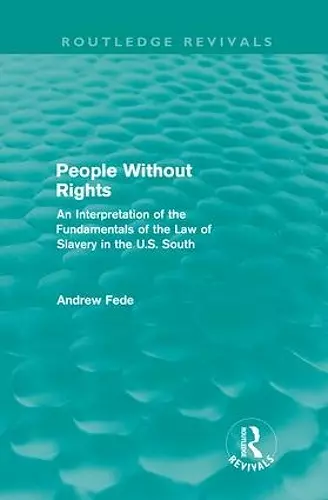People Without Rights (Routledge Revivals)
An Interpretation of the Fundamentals of the Law of Slavery in the U.S. South
Format:Hardback
Publisher:Taylor & Francis Ltd
Published:15th Apr '11
Currently unavailable, and unfortunately no date known when it will be back
This hardback is available in another edition too:
- Paperback£45.99(9780415669719)

First published in September 1992, the book traces the nature and development of the fundamental legal relationships among slaves, masters, and third parties. It shows how the colonial and antebellum Southern judges and legislators accommodated slavery’s social relationships into the common law, and how slave law evolved in different states over time in response to social political, economic, and intellectual developments.
The book states that the law of slavery in the US South treated slaves both as people and property. It reconciles this apparent contradiction by demonstrating that slaves were defined in the law as items of human property without any legal rights. When the lawmakers recognized slaves as people, they burdened slaves with added legal duties and disabilities. This epitomized in legal terms slavery’s oppressive social relationships. The book also illustrates how cases in which the lawmakers recognized slaves as people legitimized slavery’s inhumanity. References in the law to the legal humanity of people held as slaves are shown to be rhetorical devices and cruel ironies that regulated the relative rights of the slaves’ owners and other free people that were embodied in people held as slaves. Thus, it is argued that it never makes sense to think of slave legal rights. This was so even when the lawmakers regulated the individual masters’ rights to treat their slaves as they wished. These regulations advanced policies that the lawmakers perceived to be in the public interest within the context of a slave society.
`[A] convincing argument that the alleged ‘rights’ of slaves served to protect their masters’ property interests[.]'Manfred Berg, University of Heidelberg, in Historical Justice in International Perspective: How Societies Are Trying to Right the Wrongs of the Past (2009)
`The legal materials that Fede cites are sufficient support for his central message that slave law was an instrument of oppression concerned with property rights of the master, even when it appeared to recognize the legal personality of the slave …. People Without Rights … is an honest and thoughtful confrontation with the evidence that has been accumulating about the actual operation of the law of slavery, and it is a tonic that we should receive.'Arthur Howington, Shelton State Community College, The Journal of Southern History
ISBN: 9780415618793
Dimensions: unknown
Weight: 680g
282 pages